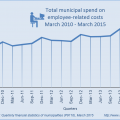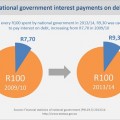Non-agricultural formal employment decreases in the first quarter
The March 2015 Quarterly Employment Statistics (QES) survey showed that total formal non-agricultural employment decreased by 44 000 jobs from 8 986 000 in the fourth quarter of 2014 to 8 942 000 in the first quarter of 2015.This is a quarterly decrease of 0.5 %. The quarterly decrease was mainly due to decreases reported read more »

Bonuses and summer: two trends that affect municipal spending
Salary bonuses and changing seasons shift municipal spending, according to data from Stats SA’s latest Quarterly financial statistics of municipalities report. Bonuses paid to municipal staff drove up employee-related costs at the end of 2014. Municipalities spent R19,3 billion on employees in the quarter ended December 2014, decreasing to R17,6 billion in the quarter ended read more »

Turnover falls by 5,2% quarter-on-quarter in the private sector
Turnover for private sector enterprises dropped by 5,2% in the first quarter of 2015, the highest quarter-on-quarter percentage decrease since the first quarter of 2010. Total turnover fell from R2,06 trillion in the fourth quarter of 2014 (the quarter ending December) to R1,95 trillion in the first quarter of 2015 (the quarter ending March), according read more »

African statistics have come of age
Africa Renewal: Some experts say there is a major problem with how statistics are collected in Africa. What is the problem? Pali Lehohla: There is a major challenge on the continent with statistics. But in interpreting the problem, there are two major trends. There is one based less on facts and more on hype. This one gets very popular and is widely publicized. There read more »

Buildings completed in 2014
The value of building plans passed and buildings completed are two indicators that can be used to gauge the state of the building industry. The infographic below outlines some key findings from Stats SA’s latest Selected building statistics of the private sector as reported by local government institutions report. Download the complete publication here.

Notice on the premature release of Consumer Price Index data
17 June 2015 An unforeseen technical fault caused a breach in the embargo time of the Consumer Price Index (CPI) release of the May 2015. Twenty-two (22) mailing list subscribers received the release earlier than the normal planned time. The scheduled time for the release of CPI data was 10H00 on Wednesday, 17 June 2015; read more »
Mbalo Brief – June 2015
The African continent is faced with many challenges such as, amongst others, terrorism, poverty and gender inequality. Thus, this month, 54 African heads of state are attending the 25th African Union Summit in South Africa from 07 to 15 June to find tangible plans to address these challenges and to focus on how to develop the African continent.The summit read more »

Municipalities experience a rise in employee-related costs
Employee-related costs of municipalities rose from R61,2 billion in 2012/13 to R68,4 billion in 2013/14, an rise of 11,6%. This is one of the findings from the latest Financial census of municipalities report published by Stats SA. Metropolitan municipalities contributed 57,3% (R39 billion) of total municipal employee related costs in 2013/14. Local municipalities contributed 34,6% read more »

Debt, taxes and spending: national government finances in the spotlight
Approximately 9% (or R101 billion) of total national government expenditure for the 2013/14 financial year was on interest on state debt. This is one of the findings from Stats SA’s latest Financial statistics of national government report. Using financial data from 41 government departments, the report measures national government spending, broken down by function (e.g. read more »

The importance of coal
Calls to decrease the world’s dependence on coal as an energy source are well intentioned. Lower use would reduce greenhouse gas emissions, and less demand would lower the environmental risk of coal mining. However, as the world moves away from coal, South Africa will need to consider the implications. The country depends heavily on the read more »

